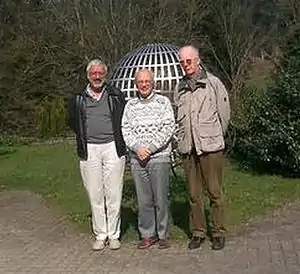Helmut Schwichtenberg
Helmut Schwichtenberg (born April 5, 1942[1] in Żagań) is a German mathematical logician.

Schwichtenberg studied mathematics from 1961 at the FU Berlin and from 1964 at the University of Münster, where he received his doctorate in 1968 from Dieter Rödding.[1][2][3] He then worked as an assistant and then as a professor in Münster, and since 1978 has been professor of mathematical logic at the Ludwig-Maximilians-Universität Munich[1] (successor of Kurt Schütte).
Schwichtenberg deals with, among other things, proof theory, theory of computability, lambda calculus and applications of logic in computer science. He He is a member of the Bavarian Academy of Sciences.
Selected publications
- Helmut Schwichtenberg and Kurt Schütte (1990). "Mathematische Logik". In Gerd Fischer and Friedrich Hirzebruch and Winfried Scharlau and Willi Törnig (ed.). Ein Jahrhundert Mathematik, 1890–1990 – Festschrift zum Jubiläum der DMV. Dokumente zur Geschichte der Mathematik (in German). 6. Braunschweig: Vieweg. pp. 717–740. ISBN 3-528-06326-2.
- Helmut Schwichtenberg and Anne S. Troelstra (1996). Basic Proof Theory. Cambridge Tracts in Theoretical Computer Science. 43 (1st ed.). Cambridge: Cambridge University Press. ISBN 0-521-57223-1. (2nd edition 2000: ISBN 0-521-77911-1)
- Helmut Schwichtenberg and Stanley S. Wainer (2012). Proofs and Computations. Cambridge: Cambridge University Press. ISBN 978-0-521-51769-0.
- Helmut Schwichtenberg (2006). "An arithmetic for polynomial-time computation". Theoretical Computer Science. 357 (1–3): 202–214. doi:10.1016/j.tcs.2006.03.019.
References
- Jürgen Elstrodt and Norbert Schmitz (Apr 2013). "Ehemalige Professoren 1945–1969". Entwicklung der Mathematik an der Universität Münster (PDF) (in German). p. 283.
- Helmut Schwichtenberg (1968). Eine Klassifikation der mehrfach-rekursiven Punktionen [A Classification of Multiple Recursive Functions] (PDF) (Ph.D. thesis) (in German). Universität Münster. S2CID 17197421.
- Helmut Schwichtenberg at the Mathematics Genealogy Project
External links
This article is issued from Wikipedia. The text is licensed under Creative Commons - Attribution - Sharealike. Additional terms may apply for the media files.